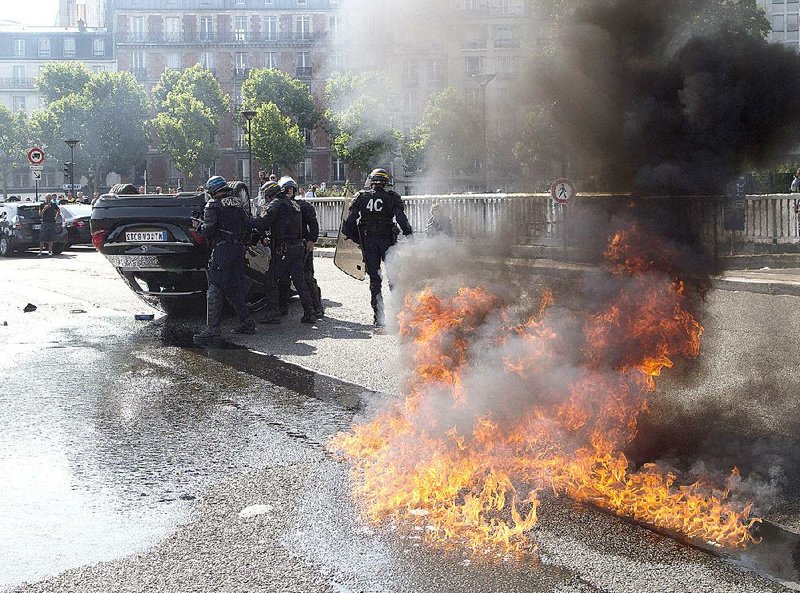PARIS -- French taxi drivers overturned cars, set tires ablaze and blocked traffic across the country on Thursday in a nationwide strike aimed at Uber after weeks of rising, sometimes violent tensions over the U.S. ride-hailing company.
Travelers going to and from the airport walked alongside highways with their bags or got caught in ambushes.
Taxi drivers claim Uber's lower price service is taking their livelihood away.
Despite repeated rulings against the low-cost UberPop service, its drivers continue to ply French roads and the American ride-hailing company is actively recruiting drivers and passengers alike. Uber claims to have a total of 400,000 customers a month in France.
Police chased strikers from Paris' ring road, where protesters torched tires in the middle of the roadway and swarmed onto exit ramps at rush hour.
France's top security official said he had ordered an immediate ban on unlicensed services like UberPop in the Paris region but called for an end to violence against the service's drivers.
"We are calling for calm. We are in a state of law," Interior Minister Bernard Cazeneuve said. "A state of law is not a state of violence."
Uber's more expensive livery service is still legal but a source of intense frustration for French taxi drivers, who pay tens of thousands of dollars for licenses and who face customer complaints that they are resistant to changes such as credit cards and geolocation.
Taxi drivers complain that livery services like Uber unfairly undercut them and in recent weeks nearly 100 Uber drivers have been attacked, sometimes while carrying customers. One irritated taxi passenger was left with a black eye after he praised Uber.
"There are people who are willing to do anything to stop any competition," said Thomas Meister, a spokesman for Uber. "We are only the symptom of a badly organized market."
The French government, meanwhile, said nearly 500 legal cases have been filed across the country involving complaints about UberPop, the lowest cost service. Several drivers' cars have been impounded. The officials reiterated concerns about safety of passengers, insisting they are not protected in case of an accident by an UberPop driver.
Strikers darted by the dozens onto Paris' ring road near a main entrance to the city to create traffic chaos, then dashed away as police tried to catch them. The Liberation newspaper said taxi drivers attacked a photographer. At the airports, police were checking entering cars in hopes of avoiding more violence.
Images from around the city captured a sense of the taxis' rage, with an Uber-style livery car overturned, others with tires slashed and windshields shattered.
Fast-moving technological innovations such as smartphone apps have given the French government headaches when it comes to adapting national laws. And in France, where the unemployment rate is in the double-digits -- and far higher among young men and unskilled workers -- many of the jobless are looking for economic opportunities wherever they can find them.
Even Interior Ministry officials admit the emergence of Uber and similar services -- which can feature perks such as free bottled water, polite drivers and the chance to pay by credit card -- have created a competitive market that has forced changes in the taxi industry.
Addressing a leading complaint of taxi drivers -- that authorities are not doing enough to apply the new law -- ministry officials emphasized that it will take time to implement the law fully.
Serge Metz chief executive officer of the G7 taxi service acknowledged room for improvement, especially in terms of quality of service that taxis offer, but said unfair competition was making drivers' lives impossible.
"This is the first time we've had a multinational so cynical that, in every country where it operates, flouts the laws in place and lobbies with an army of lawyers and lobbyists to change the laws," Metz said.
Information for this article was contributed by Jamey Keaten and Thomas Adamson of The Associated Press.
Business on 06/26/2015
